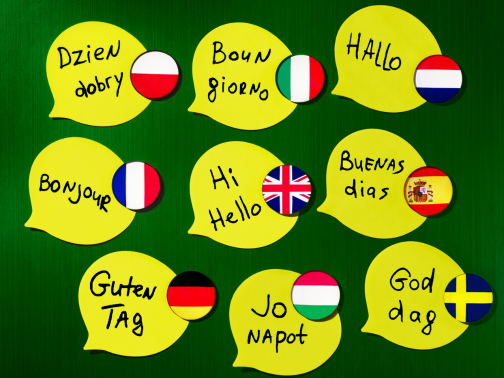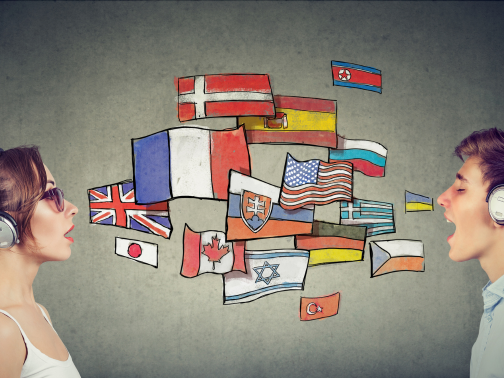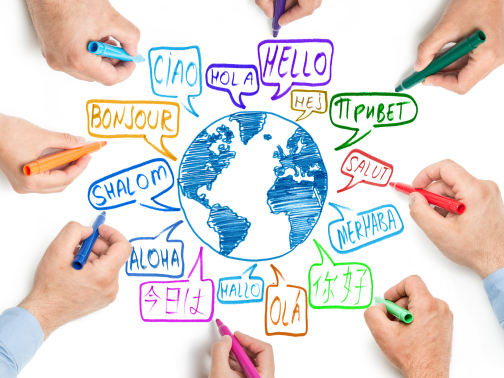Contents
Toggle
Meet Beenish Aslam, an accomplished MPhil scholar, and writer at Wonderful World English. Beenish has a wealth of experience in education, and we sought out her expertise to provide fresh insights into this dynamic world.
Are you a language enthusiast who appreciates the awesomeness of being able to communicate?
In today’s globalized world, language learning has become as popular as ever!
Did you know that there are over 7,000 different languages today?
That’s a lot of languages, although many are not widely spoken.
People take the time to learn different languages for various reasons.
Some may learn a new language as a hobby or enhance their travels, while others know it to broaden their academic or professional horizons.
Whatever the reason, it is always impressive when someone can speak more than one language.
As impressive as it is to be bilingual, some people have learned over ten languages!
But how is this possible, and can people learn even more languages?
The truth is, there is no known limit to how many languages a person can learn. Instead, it depends on an individual’s mental capacity, dedication, and desire to learn. With the proper enthusiasm and determination, people can learn as many dialects as they want. But it will take time, effort, and commitment.
I am fascinated by the world of communication and am fluent in three languages.
I can attest firsthand to what it takes to learn a new language, and today, I want to share some insights into the wonders of language learning.
In this article, we will explore the wonders of the human capacity to learn languages and see some examples of those who’ve pushed this capacity to the limit!
Let’s jump in!

How Many Languages Can a Human Learn?
You may be intrigued to know that a man who lived in the 19th century claimed to know 200 languages and could speak 100!
His name was Sir John Bowring, a British political economist and the fourth Governor of Hong Kong.
One can only imagine the hard work and dedication it takes to learn 200 languages.
It takes a great deal of commitment to master a new language, and there is a difference between understanding and getting it.
To master a language, the learner will be able to understand the unique grammar rules and vocabulary in spoken and written form.
The time it takes to master a language will vary depending on the language itself.
Is it similar to your native tongue or a world apart?
For example, an English speaker can achieve fluency in Spanish or French (23-24 weeks) much faster than in a language like Arabic or Mandarin (88 weeks).
You can check out the length of time it takes on average for English learners to learn other languages on the Language Difficulty Ranking Index.
Nowadays, most people can expect to learn around ten languages fluently if they apply themselves and study.
Of course, there are exceptions; a Liberian person named Ziad Fazah can speak 59 different languages (most of which he learned before age 20)!
This shows what a person can do if they commit to learning languages.
You could theoretically learn dozens of languages if you implemented effective strategies and persisted.
You may be wondering how you can learn multiple languages simultaneously.
Check out the guide below to find out how!
Related Article: How to Learn Multiple Languages – Ultimate Guide

1. How Many Languages Can the Average Person Speak?
The average person can achieve fluency in two to four languages.
A child’s brain is much more receptive to language learning so that a person can be multi-lingual from a young age under the right circumstances.
The human brain varies from person to person, and some people will take to language learning much better than others.
Typically, learning a new language can take a few months to years, depending on how much the individual commits themselves and how receptive they are to learning the language, etc.
It’s essential for anyone learning a new language to practice speaking as much as they can.
With more practice, fluency will be achieved at a much faster rate.
Did you know that English is considered the world’s Lingua Franca?
This means that it is the most commonly learned language among non-native speakers.
Asia is a prime example, with several countries holding it as an official language.
Find out more in the guide below!
Related Article: What Asian Countries Speak English? – Full Guide

2. Can People Learn Multiple Languages at the Same Time?
The answer to whether people can learn multiple languages at the same time is very dependent on the intellectual capability of the individual.
Some people can learn different languages at a time without getting puzzled or confused, while others will struggle with this.
Everyone has strengths and weaknesses; if you take to languages well, you could try to learn multiple languages simultaneously.
I would suggest, however, sticking to the one.
You can put all your focus into it and have fluency much faster than if you were also trying to comprehend the elements in a different language.
If two languages are similar, it can confuse them too.
Don’t be surprised to mix up words and grammar rules if you choose to learn two similar languages, French, Spanish, and Italian.
Despite this, if you are feeling brave enough to take on this task, as your linguistic proficiency develops, your confusion will naturally start to lessen.
It is recommended that a person who is confident learning languages should learn no more than 3 to 4 at a time.

3. Pros of Learning Multiple Languages
There are many great reasons why learning multiple languages can be a great goal.
Let’s take a closer look at some of the biggest pros of learning multiple languages:
– Professional Development
A significant advantage of knowing multiple languages is that it will allow you to stand out in the workplace.
Many of the world’s most successful people have been proficient in at least a couple of languages, and it will allow you to forge relationships with clients and partners from different backgrounds and cultures.
Teaching English as a Second Language (ESL) is a popular career choice for many native English speakers.
But do they need to be bilingual to teach ESL effectively?
Find out in the article below!
Related Article: Do You Need to Be Bilingual to Teach ESL? – Teacher’s Answer
– Relationships
A person who can speak multiple languages can form friendships and relationships with people in different parts of the world with whom they would otherwise never have been able to communicate.
This can be a wholesome experience and very rewarding for both you and those you come into contact with.
– Better Understanding
By learning multiple languages, a person will undoubtedly develop a greater understanding of the world.
They will be able to form new ideas and seek insights from different cultures that may not be so prevalent in their own.
Many advantages come with learning a new language; imagine what you could do if you could understand an entirely different dialect!
– Personal Development
Many significant aspects positively influence a person’s personal development when they can speak multiple languages.
Many great rewards come from learning new languages, from increased confidence to improved cognitive function.
By training your brain to think in new ways, you will naturally be able to learn things faster and become an all-around better version of yourself in the process.
Not bad, eh?

4. Challenges of Learning Multiple Languages
As noted above, learning multiple languages is not the easiest of tasks.
It takes a lot of time, dedication, and effort!
Let’s look at some of the most common obstacles that people face when learning multiple languages and what they can do to overcome them:
– Time Management
One of the most challenging aspects of learning multiple languages is the time it takes!
It can be challenging to remain consistent and fit language learning into many people’s schedules.
This is normal; if you are someone to whom this applies, don’t panic.
Pick yourself up, dust yourself off, and get back to it.
With the right level of patience and persistence, you will achieve your goal of learning one or more other languages.
– Boredom
Many people get bored on their way to mastering a new language.
To deal with this, you can join different language learning groups to meet people learning the same language.
This strategy will help you meet people of the same interest, making your learning journey engaging and fun-filled.
Always have one eye on the result; the rewards will be worth the boredom that can come through studying things like grammar rules, etc.
– Lack of Guidance
Another potential obstacle in learning a different language is insufficient strategy or guidance.
It can be overwhelming for anyone who doesn’t know the language learning process.
But it is true that once someone has learned a second language, learning a third, fourth, fifth, and so on becomes much more accessible.
This is because they now understand what it takes to learn a language and have learned from the obstacles they faced when learning a second language.
Any language learner should seek proper guidance, whether by enrolling on a language learning platform or seeking a tutor; there are several ways to make their language learning journey much smoother.

Conclusion
In conclusion, there is no set number of languages a person can learn, and it is dependent on them as an individual.
People can learn many languages with proper guidance, motivation, and patience!
There is no guarantee that someone can learn several languages simultaneously; this depends on intellectual capability and motivation.
We recommend you concentrate on one language at a time.
Set a consistent learning schedule and look for several strategies to develop your most suitable plan.
There are thousands of languages to choose from, so what are you waiting for?
We hope this has answered your question and helped you better understand the human capacity for language learning.
Image Attribution: All images licensed via canva.com





